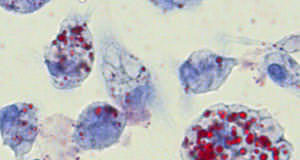Losing Weight From Either A Low-Carb Or Low-Fat Diet Lowers Body...
A study by researchers at Johns Hopkins Medicine shows that when overweight or obese people lose weight, whether through a low-carb or low-fat diet, they can have a significant reduction in inflammation throughout their body, as measured by three common markers for inflammation.
An Apple A Day Lowers Level Of Blood Chemical Linked To...
Eating an apple a day might in fact help keep the cardiologist away, new research suggests. In a study of healthy, middle-aged adults, consumption of one apple a day for four weeks lowered by 40 percent blood levels of a substance linked to hardening of the arteries.
Patients With Rheumatoid Arthritis Appear To Be At Increased Risk For...
A study that included more than 45,000 residents of Sweden with rheumatoid arthritis finds that individuals with this disease had an associated higher risk of venous thromboembolism (a blood clot that forms within a vein), and that this elevated risk was stable for 10 years after the time of diagnosis, according to a study in the October 3 issue of JAMA.
Increase In Allergies Is Not from Being Too Clean, Just Losing...
A new scientific report out October 3 from the International Scientific Forum on Home Hygiene (IFH)[i] dismantles the myth that the epidemic rise in allergies in recent years has happened because we're living in sterile homes and overdoing hygiene.
New Way Of Fighting High Cholesterol Upends Assumptions
Atherosclerosis -- the hardening of arteries that is a primary cause of cardiovascular disease and death -- has long been presumed to be the fateful consequence of complicated interactions between overabundant cholesterol and resulting inflammation in the heart and blood vessels.
Sinusitis Linked To Microbial Diversity
A common bacteria ever-present on the human skin and previously considered harmless, may, in fact, be the culprit behind chronic sinusitis, a painful, recurring swelling of the sinuses that strikes more than one in ten Americans each year, according to a study by scientists at the University of California, San Francisco.
Why Some Fats Are Worse Than Others
All dietary fats are not created equal. Some types of fats have been linked to ailments like heart disease and diabetes, while others, like those often found in plants and fish, have well documented health benefits. So why do our bodies respond so destructively to some fats but not others? A new hypothesis described in latest issue of The Quarterly Review of Biology suggests the answer may lie in how different fats interact with the microbes in our guts.
Meditation Reduces Loneliness
Many elderly people spend their last years alone. Spouses pass and children scatter. But being lonely is much more than a silent house and a lack of companionship. Over time, loneliness not only takes a toll on the psyche but can have a serious physical impact as well.
Bacteria-Immune System ‘Fight’ Can Lead to Chronic Diseases, Study Suggests
Results from a study conducted at Georgia State University suggest that a "fight" between bacteria normally living in the intestines and the immune system, kicked off by another type of bacteria, may be linked to two types of chronic disease.
How Natural Drug, Abscisic Acid, Fights Inflammation
Researchers at the Virginia Bioinformatics Institute at Virginia Tech have discovered how abscisic acid, a natural plant hormone with known beneficial properties for the treatment of disease, helps fight inflammation. The results, which are published in the November 2010 Journal of Biological Chemistry, reveal important new drug targets for the development of treatments for inflammatory and immune-mediated diseases.
Role Of Fungus In Digestive Disorders Explored
Cedars-Sinai researchers say their examination of the fungi in the intestines suggests an important link between these microbes and inflammatory diseases such as ulcerative colitis.In the new study, published in the June 8 issue of Science, researchers at Cedars-Sinai's Inflammatory Bowel and Immunobiology Research Institute identified and characterized the large community of fungi inhabiting the large intestine in a model of the disease.
Key Gene Found Responsible For Chronic Inflammation, Accelerated Aging And Cancer
Researchers at NYU School of Medicine have, for the first time, identified a single gene that simultaneously controls inflammation, accelerated aging and cancer. "This was certainly an unexpected finding," said principal investigator Robert J. Schneider, PhD, the Albert Sabin Professor of Molecular Pathogenesis, associate director for translational research and co-director of the Breast Cancer Program at NYU Langone Medical Center.

















